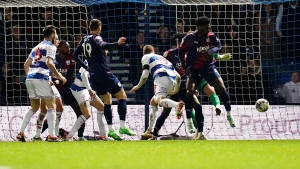Stanley Bowles raised his arms into the air and took the acclaim of the Loftus Road crowd.
It was a familiar sight throughout the 1970s, but this was August 2015 and was to be the last time Bowles graced the pitch he once ruled.
Bowles, the former QPR, Brentford and England inside-forward, has died aged 75 after a long battle with Alzheimer’s disease.
He looked in good physical shape as he was presented to the crowd on ‘Stan Bowles Day’, QPR’s home fixture against Rotherham, but his condition had already taken its toll.
Nevertheless Don Shanks, Bowles’ best friend and former Rangers team-mate who accompanied him out on to the pitch, told the Guardian: “When Stan walked out at Loftus Road he knew exactly where he was, for some reason. A moment of knowing who he was.”
The epitome of the 1970’s football maverick, there was a time when pretty much everyone knew who Bowles was.
Born in Collyhurst, Manchester, on Christmas Eve 1948, Bowles began his career as an apprentice at Manchester City.
A brief stint at Bury followed before Bowles joined Fourth Division Crewe, whose manager Ernie Tagg came up with the immortal line: “If Stan could pass a betting shop like he can pass a football, he’d be a rich man.” Without the benefit of hindsight, it would go on to sum up an entire career.
Bowles moved up two divisions to join Carlise and then, in September 1972, signed for QPR for a fee of £110,000.
Over the next seven years, Bowles made 315 league appearances for Rangers and scored 97 goals.
Yet those figures barely scratch the surface of Bowles’ talent – think Lionel Messi playing with a cigarette in one hand, a lager top in the other and a copy of the Racing Post sticking out of his back pocket.
A snake-hipped bag of bones, often wearing a kit that seemed to look two sizes too big, Bowles jinked, feinted, dribbled and darted past the poor, unsuspecting full-backs of the day.
A trademark goal would see Bowles drop his shoulder, cut inside on to his right foot and effortlessly accelerate, leaving a right-back floundering in a blur of quick feet and long hair, before driving the ball in at the near post.
The trouble was – as Tagg alluded to – that Bowles knew his way around the watering holes and betting shops around Loftus Road almost as well as he knew his way around the pitch.
So naturally talented was Bowles that he felt he did not have to try, an attitude which ultimately limited him to only five England caps, his one international goal coming against Wales at Ninian Park in 1974.
In 1979, a move to Nottingham Forest and a relationship made in hell with Brian Clough was predictably unsuccessful and a year later Bowles joined Second Division Leyton Orient.
He wound down his playing career back in west London with Brentford, enjoying an Indian summer which saw him named the club’s player of the year in 1982. Bowles is fondly remembered for his time at Griffin Park and in a recent poll was voted the best player in their history by fans of both QPR and Brentford.
Less auspicious was an appearance on TV’s Superstars, where athletes competed against each other at different sports. A hungover Bowles scored seven points, the lowest in the show’s history.
A chaotic lifestyle was characterised by Bowles agreeing sponsorship deals with two different boot companies for the same match and wearing one of each.
Upon his retirement, in 1984, Bowles moved into after-dinner speaking, worked as a pundit for Sky Sports and had his own betting column. His 1996 autobiography revealed the extent of his drinking, womanising and gambling during his playing days.
In his later years, Bowles could be spotted flitting between the pubs and the bookies of Shepherd’s Bush, now without the inconvenience of having to fit a football match in between.
Upon being diagnosed with Alzheimer’s, Bowles moved back to Manchester to be cared for by his eldest daughter, Andria. He is survived by Andria, his second daughter, Tracy, and son Carl.





























